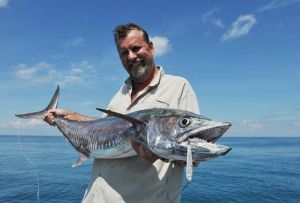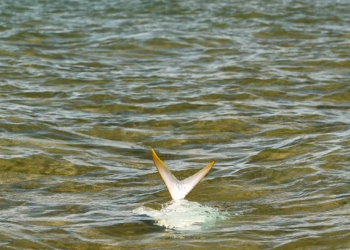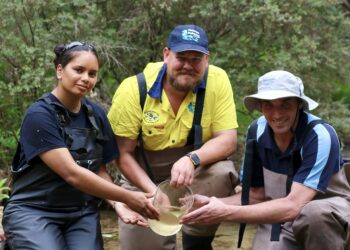THE NSW Food Authority says it has received notification of four ciguatera food poisoning cases resulting from the consumption of a large Spanish mackerel (over 10kgs) caught by a licensed fisher on Chaos Reef, south east of Evans Head NSW.
This incident follows recent reports of ciguatera poisoning to Queensland Health authorities, reportedly following the consumption of a Spanish mackerel caught on the Gold Coast – see report here.
The NSW Food Authority has issued information on ciguatera to help advise fishers that consumption of Spanish mackerel above 10kgs (as advised by NSW industry experts) represents an increased risk of poisoning. See below for more information.
What is ciguatera poisoning?
Ciguatera poisoning is a form of food poisoning. It is caused by eating warm water finfish that carry ciguatera poison (toxin). Small plant eating fish eat toxic algae and inturn are eaten by larger predatory fish like Spanish mackerel.
What are the symptoms?
Symptoms usually start one to 24 hours after eating a toxic fish. The time before onset of illness and the range of symptoms can depend on how much fish is eaten, which parts of the fish are eaten, how much toxin is in the fish and the individual susceptibility of the consumer.
Symptoms include:
Tingling and numbness in fingers, toes, around lips, tongue, mouth and throat burning sensation or skin pain on contact with cold waterjoint and muscle pains with muscular weaknessnausea, vomiting, diarrhoea and/or abdominal cramps, headache, fatigue and fainting, extreme itchiness, often worsened by drinking alcohol, difficulty breathing in severe cases.
How can you minimise the risk of ciguatera poisoning?
Ciguatera toxin does not affect the appearance, odour or taste of fish. Processes like cooking or freezing will not destroy it and there is no method for removing it from fish. To minimise the risk, commercial fishers and consumers should avoid eating large Spanish Mackerel (10kgs or more, in accordance with NSW industry experts) and avoid eating the head, roe, liver and viscera, as the toxin is concentrated in these areas. Ciguatera is more common in warmer northern waters of Queensland and the Northern Territory.
Treatment
Promptly seek medical attention from a hospital of GP at the onset of symptoms. If you are concerned about ciguatera poisoning contact your Local Public Health Unit on 1300 066 055 or if you would like further information contact the NSW Food Authority helpline on 1300 552 406 or contact@foodauthority.nsw.gov.au





















